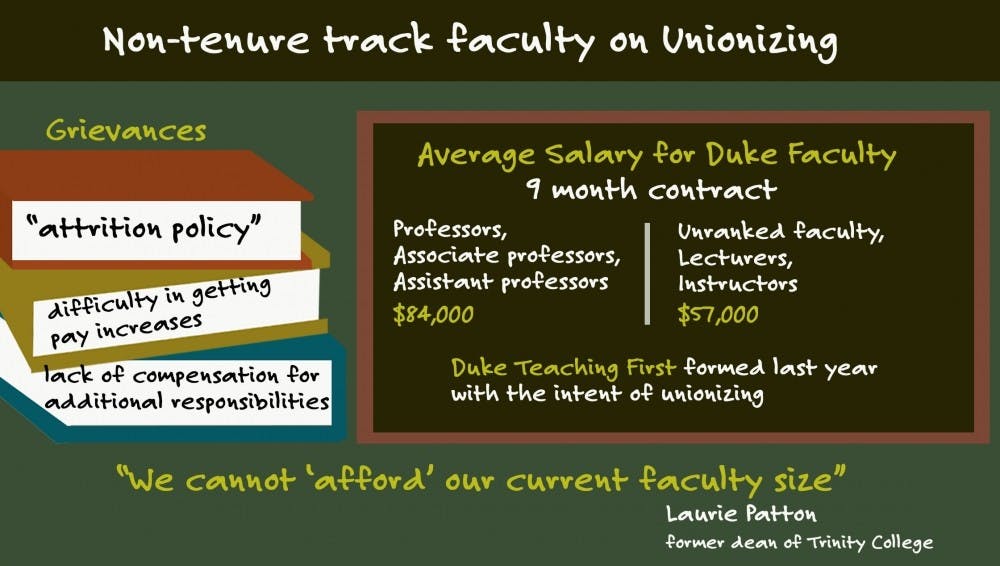Adjunct faculty members will learn Friday if their efforts to unionize have been successful.
After months of discussing the idea of organizing a union, Duke Teaching First, an organization of non-tenure track faculty members, is reaching the conclusion of its unionization campaign. Duke’s non-tenure track professors, part-time professors and lecturing fellows filed a petition with the National Labor Relations Board before an agreement was reached to exclude regular rank, non-tenure track professors—professors of the practice, research professors and lecturers—from the voting process.
The remaining non-regular rank, non-tenure track faculty have voted on whether to unionize, with many hoping that a union will ease concerns about job security, future wages and benefits. They will learn the vote results soon after the ballots are counted Friday.
“All the time up to this point, it was all sort of theoretical. But now that we’ve actually filed the paperwork and now that we’ve drawn the outlines…that actually took a lot out of it,” said Jim Haverkamp, an instructor in the arts of the moving image program and a member of Duke Teaching First. “It’s just like a regular election.”
According to the NLRB Representation Petition, which was obtained by the Chronicle, the NLRB grants a unionization election if it determines that there is sufficient interest in unionization among non-tenured faculty. In order to create the union and begin negotiations with the University, a majority of the non-regular rank faculty must vote in favor of unionization.
After speaking to colleagues who belong to the bargaining unit, Matteo Gilebbi, a lecturing fellow in the Department of Romance Studies and another member of DTF, said he was confident that the vote would pass.
“Everybody’s really, really excited,” Gilebbi said. “Everybody thinks that the union would be a great way to improve the working conditions of contingent faculty. People are now asking questions [about] details of the bargaining process.”
Haverkamp said that if there is a majority vote in favor of the union, DTF will gather more information about the grievances of the “people in the bargaining unit” and will form a negotiating committee. Members of the committee will then engage in contract negotiations with representatives of Duke’s administration.
Although several tenured professors have expressed concerns about the potential consequences of unionization and contract negotiations, other full-time faculty support DTF’s effort.
In December, faculty members, including tenured professors, bought an advertisement in The Chronicle with an open letter to President Richard Brodhead. Among the ad’s main messages was that Duke’s investments in construction and overseas campuses demonstrate that it has the financial resources to also offer adjunct faculty better working conditions.
DTF garnered additional support March 10 when the Durham City council passed a resolution unanimously endorsing the rights of faculty members to petition for greater benefits.
“These faculty want to have a collective voice to help improve working conditions in order to be more effective teachers, researchers and professionals,” the council’s resolution reads. “The decision of whether to unionize belongs solely to the workers of Duke University.”
DTF’s campaign dates back to last year, when several contingent faculty members began to discuss their grievances about job security, working conditions, benefits and salaries.
Since then, however, the number of faculty eligible to unionize has declined. Duke and the Service Employees International Union, which is sponsoring the unionization campaign, agreed that only non-regular rank faculty members in the Trinity College of Arts and Sciences, the Graduate School and the Center for Documentary Studies will be able to participate in the collective bargaining process.
“The University and SEIU reached agreement to exclude all regular rank, non-tenure track faculty (including PoPs, Research Professors and Lecturers) from the potential bargaining unit,” Provost Sally Kornbluth wrote in an email. “As a result, regular rank, non-tenure track faculty will not be voting on SEIU representation and will not be covered by a potential collective bargaining agreement.”
Faculty efforts to unionize are not unique to Duke. The University of Chicago, Georgetown University and Tufts University are among several schools whose non-tenured faculty have joined SEIU in the past three years.
Haverkamp noted that organizers from SEIU who worked on campaigns at other schools have aided DTF in the unionization process. At the request of SEIU, several professors from the California Faculty Association, which represents faculty at state universities in California, spoke to DTF members about how forming a union can help guarantee more diversity in hiring and retaining professors, Haverkamp said.
“We had a chance to talk to them one on one and say, ‘What was it like negotiating your first contract?’ So it’s been nice,” Haverkamp said. “People that are in other unions are very willing to come and talk to you and give you advice. “
Get The Chronicle straight to your inbox
Sign up for our weekly newsletter. Cancel at any time.

